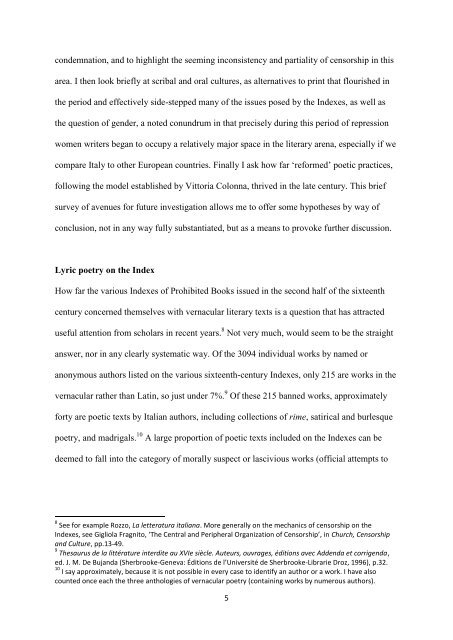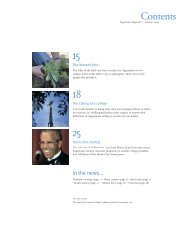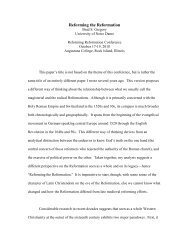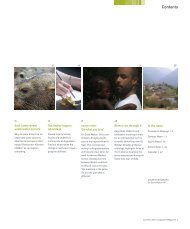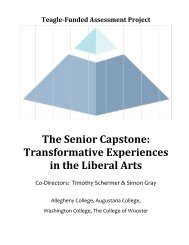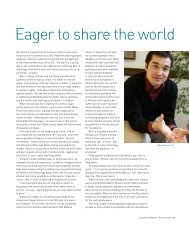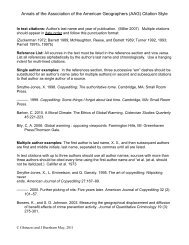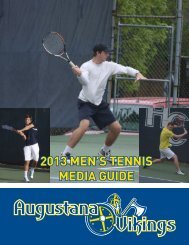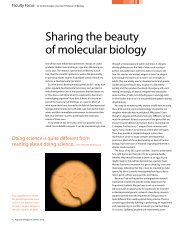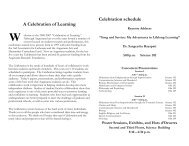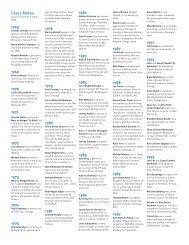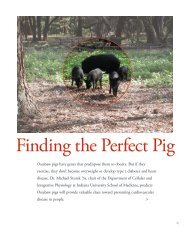Re-Writing Trent, or What Happened to Italian Literature in the Wake ...
Re-Writing Trent, or What Happened to Italian Literature in the Wake ...
Re-Writing Trent, or What Happened to Italian Literature in the Wake ...
Create successful ePaper yourself
Turn your PDF publications into a flip-book with our unique Google optimized e-Paper software.
condemnation, and <strong>to</strong> highlight <strong>the</strong> seem<strong>in</strong>g <strong>in</strong>consistency and partiality of cens<strong>or</strong>ship <strong>in</strong> this<br />
area. I <strong>the</strong>n look briefly at scribal and <strong>or</strong>al cultures, as alternatives <strong>to</strong> pr<strong>in</strong>t that flourished <strong>in</strong><br />
<strong>the</strong> period and effectively side-stepped many of <strong>the</strong> issues posed by <strong>the</strong> Indexes, as well as<br />
<strong>the</strong> question of gender, a noted conundrum <strong>in</strong> that precisely dur<strong>in</strong>g this period of repression<br />
women writers began <strong>to</strong> occupy a relatively maj<strong>or</strong> space <strong>in</strong> <strong>the</strong> literary arena, especially if we<br />
compare Italy <strong>to</strong> o<strong>the</strong>r European countries. F<strong>in</strong>ally I ask how far „ref<strong>or</strong>med‟ poetic practices,<br />
follow<strong>in</strong>g <strong>the</strong> model established by Vitt<strong>or</strong>ia Colonna, thrived <strong>in</strong> <strong>the</strong> late century. This brief<br />
survey of avenues f<strong>or</strong> future <strong>in</strong>vestigation allows me <strong>to</strong> offer some hypo<strong>the</strong>ses by way of<br />
conclusion, not <strong>in</strong> any way fully substantiated, but as a means <strong>to</strong> provoke fur<strong>the</strong>r discussion.<br />
Lyric poetry on <strong>the</strong> Index<br />
How far <strong>the</strong> various Indexes of Prohibited Books issued <strong>in</strong> <strong>the</strong> second half of <strong>the</strong> sixteenth<br />
century concerned <strong>the</strong>mselves with vernacular literary texts is a question that has attracted<br />
useful attention from scholars <strong>in</strong> recent years. 8 Not very much, would seem <strong>to</strong> be <strong>the</strong> straight<br />
answer, n<strong>or</strong> <strong>in</strong> any clearly systematic way. Of <strong>the</strong> 3094 <strong>in</strong>dividual w<strong>or</strong>ks by named <strong>or</strong><br />
anonymous auth<strong>or</strong>s listed on <strong>the</strong> various sixteenth-century Indexes, only 215 are w<strong>or</strong>ks <strong>in</strong> <strong>the</strong><br />
vernacular ra<strong>the</strong>r than Lat<strong>in</strong>, so just under 7%. 9 Of <strong>the</strong>se 215 banned w<strong>or</strong>ks, approximately<br />
f<strong>or</strong>ty are poetic texts by <strong>Italian</strong> auth<strong>or</strong>s, <strong>in</strong>clud<strong>in</strong>g collections of rime, satirical and burlesque<br />
poetry, and madrigals. 10 A large prop<strong>or</strong>tion of poetic texts <strong>in</strong>cluded on <strong>the</strong> Indexes can be<br />
deemed <strong>to</strong> fall <strong>in</strong><strong>to</strong> <strong>the</strong> categ<strong>or</strong>y of m<strong>or</strong>ally suspect <strong>or</strong> lascivious w<strong>or</strong>ks (official attempts <strong>to</strong><br />
8 See f<strong>or</strong> example Rozzo, La letteratura italiana. M<strong>or</strong>e generally on <strong>the</strong> mechanics of cens<strong>or</strong>ship on <strong>the</strong><br />
Indexes, see Gigliola Fragni<strong>to</strong>, ‘The Central and Peripheral Organization of Cens<strong>or</strong>ship’, <strong>in</strong> Church, Cens<strong>or</strong>ship<br />
and Culture, pp.13-49.<br />
9 Thesaurus de la littérature <strong>in</strong>terdite au XVIe siècle. Auteurs, ouvrages, éditions avec Addenda et c<strong>or</strong>rigenda,<br />
ed. J. M. De Bujanda (Sherbrooke-Geneva: Éditions de l’Université de Sherbrooke-Librarie Droz, 1996), p.32.<br />
10 I say approximately, because it is not possible <strong>in</strong> every case <strong>to</strong> identify an auth<strong>or</strong> <strong>or</strong> a w<strong>or</strong>k. I have also<br />
counted once each <strong>the</strong> three anthologies of vernacular poetry (conta<strong>in</strong><strong>in</strong>g w<strong>or</strong>ks by numerous auth<strong>or</strong>s).<br />
5


